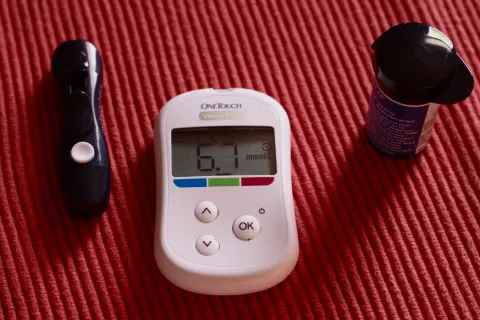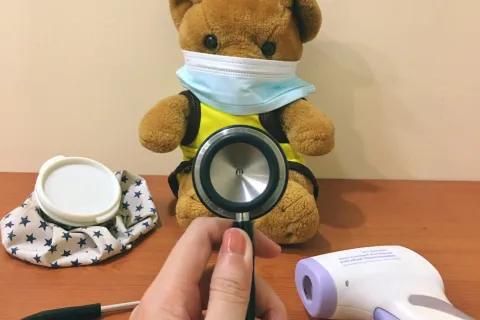Autism aggression: What can help?
By Dr. Simon WallaceAggression is among the most common challenges reported by parents of children and adolescents with autism.
A few months ago, I was visiting an autism clinic in Albania, one of the underserved countries where Autism Speaks is making a difference through our Global Autism Public Health Initiative. There I met a three-year-old girl receiving a diagnostic assessment for autism. Clearly, she wanted her parents to stop talking to us and take her outside. She kicked her father and bit his hand and then began slapping her own head. This young girl was trying to make her preferences known but lacked speech. Aggression was her way of communicating her needs.
Can autism cause aggressive behavior?
Whatever their age, some individuals on the autism spectrum act out aggressively, and clearly, this can be distressing for everyone involved. In fact, autism aggression is among the most common challenges reported by parents of children and adolescents with autism spectrum disorder.
Responding to autism aggression
I suggest working with your child’s physician and therapists on a four-stage approach to tackling this and other problem behaviors.
The four step approach for responding to autism aggression is identification, understanding, management, and prevention.
- Identify the behavior: By identification, we mean characterizing the problem behavior. As parents, you can write down the type of aggression your child demonstrates along with the time and setting of when the behavior occurs.
- Understand the behavior: Next comes understanding. Specialists often use tools such as the Functional Behavioral Assessment to decipher why a person with autism is behaving a certain way. In other words, what is the function of a given behavior for the person with autism? Is she telling you she doesn’t like what you’re doing? Is he telling his teacher that the school work is too complex? Does she want something she cannot have? Identifying the “communication” behind the behavior is the first step to teaching appropriate behaviors that can convey the person’s needs and desires.
In addition, underlying problems can trigger ASD aggression. Among those with autism, common triggers include disturbing breaks in routine, lack of sleep, jarring “sensory stimuli” (noises, lights, or smells) or even undiagnosed mental health problems. Clearly, it’s important to look beyond the behavior itself to identify the underlying cause.
- Manage the behavior: When it comes to managing aggression, there are many options. The information you gathered in identifying and understanding your child’s behavior may guide you and your child’s healthcare providers in developing a plan.
An abundance of research supports the effectiveness of Applied Behavior Analysis (ABA) in helping children with autism learn new and effective behaviors—so that aggression is no longer needed to communicate wants and needs. Research has shown that, in many cases, ABA alone is effective in reducing aggressive behaviors.
When ABA is not effective, it is important to consider the possibility of an underlying medical condition. For example, we know that autism is frequently associated with sleep disturbances and gastrointestinal distress. Disrupted sleep is likewise associated with uncontrolled seizures. Addressing these medical conditions can make a difference in reducing aggressive outbursts. Also remember that the sudden onset of aggression may signal that your child is in pain, ill, or simply exhausted.
- Prevent the behavior: Finally we have prevention. Strategies to prevent aggression include working with your child’s therapists and teachers to create calming, predictable, and rewarding environments. Other helpful approaches include visual timetables and structured schedules—both of which can help smooth transitions between activities. Rewarding positive behavior and providing communication tools are additional strategies that many families find helpful.
Medication for autism aggression
Medications for autism aggression have been used successfully to reduce aggressive behavior and self-injury in both children and adults with autism. Risperidone, in particular, has gone through extensive testing in this regard. Both risperidone (Risperdal) and aripiprazole (Abilify) are approved by the U.S. Food and Drug Administration (FDA) for treating autism-related irritability, which includes aggression, tantrums, and self-injury. A recent study demonstrated that a combination of parent training (in behavior intervention) and risperidone reduced tantrums and other problematic behaviors in children with autism to a greater degree than did medication alone.
However, the decision whether or not to use behavior modifying medication is can be difficult. Autism Speaks has developed a Medication Decision Aid Tool Kit to help you work with your child’s physician to determine whether this option fits your family’s goals and values.
Get information, resources and support
- Use the Autism Speaks Resource Guide to find providers in your area.
- Contact the Autism Response Team for help, resources and support.
- In English: 888-288-4762 | help@autismspeaks.org
- En Español: 888-772-9050 | ayuda@autismspeaks.org









